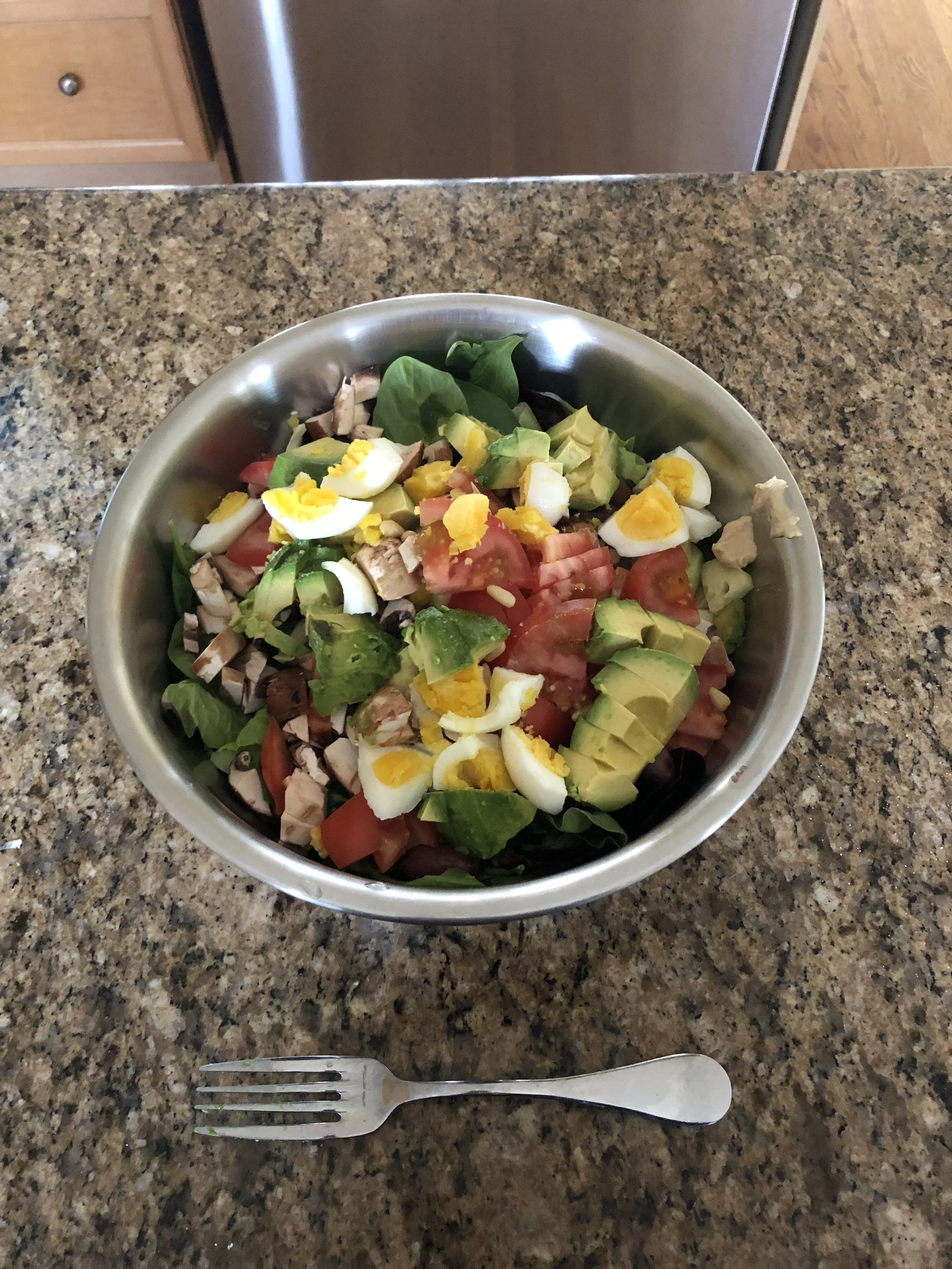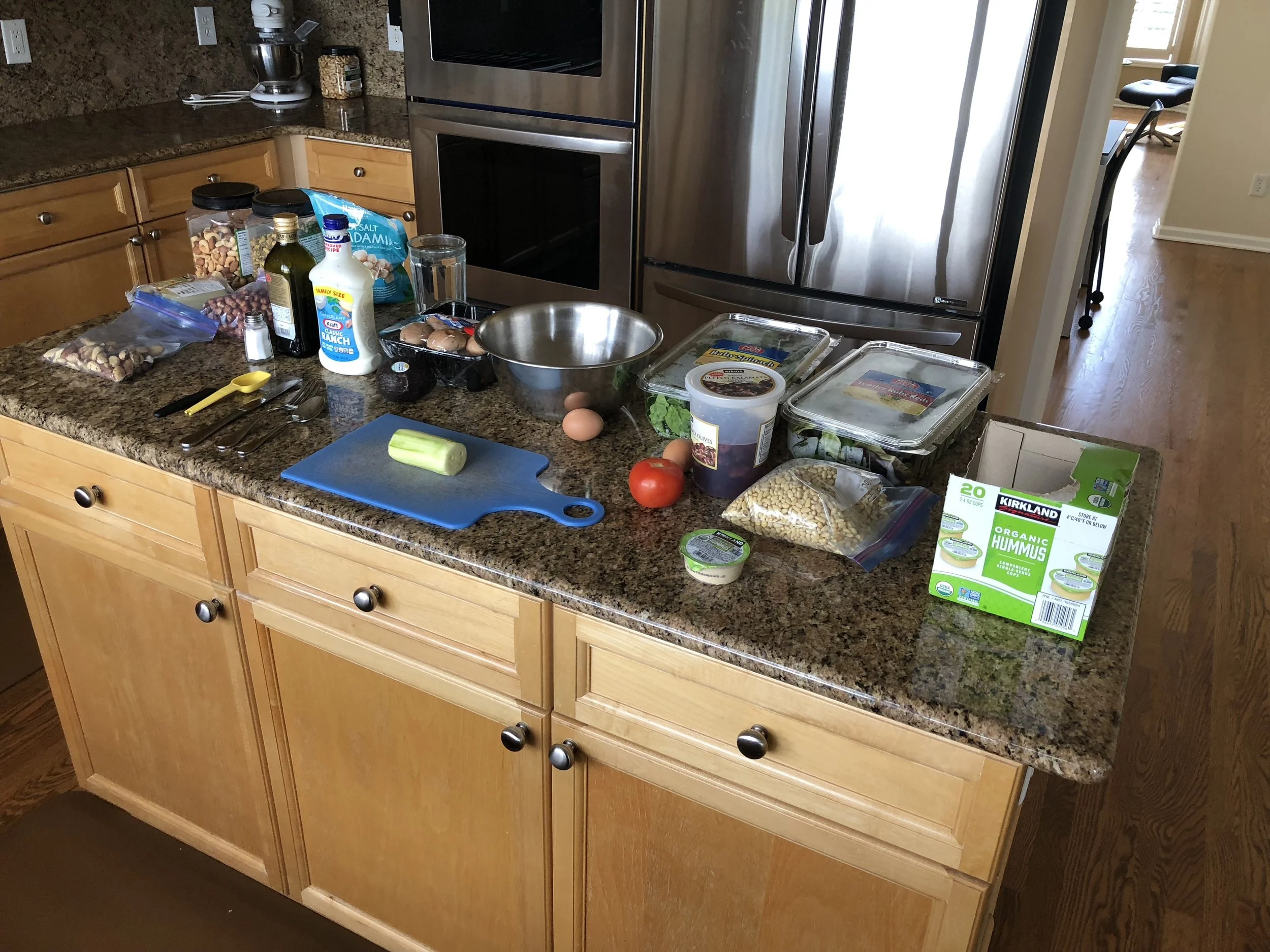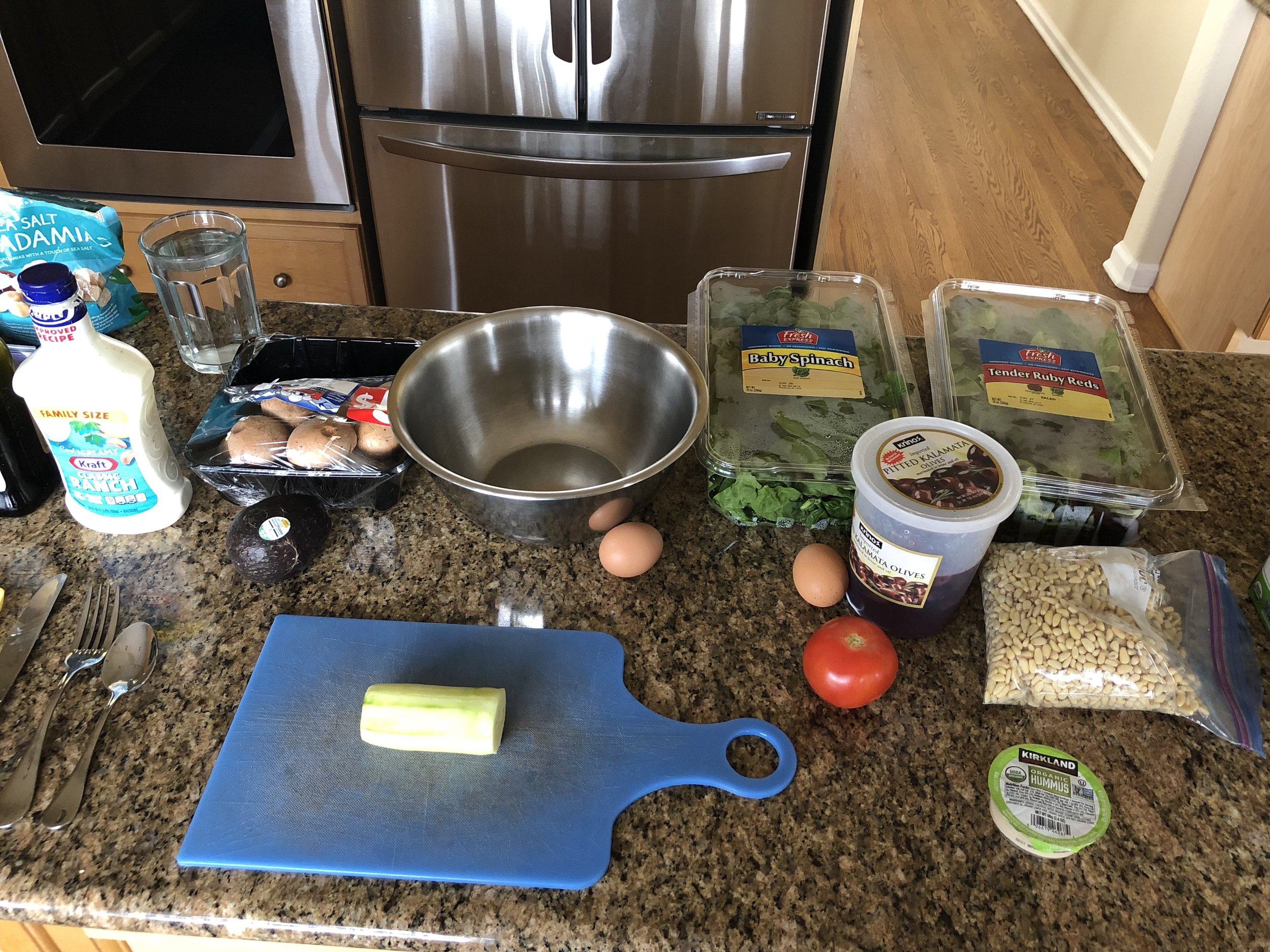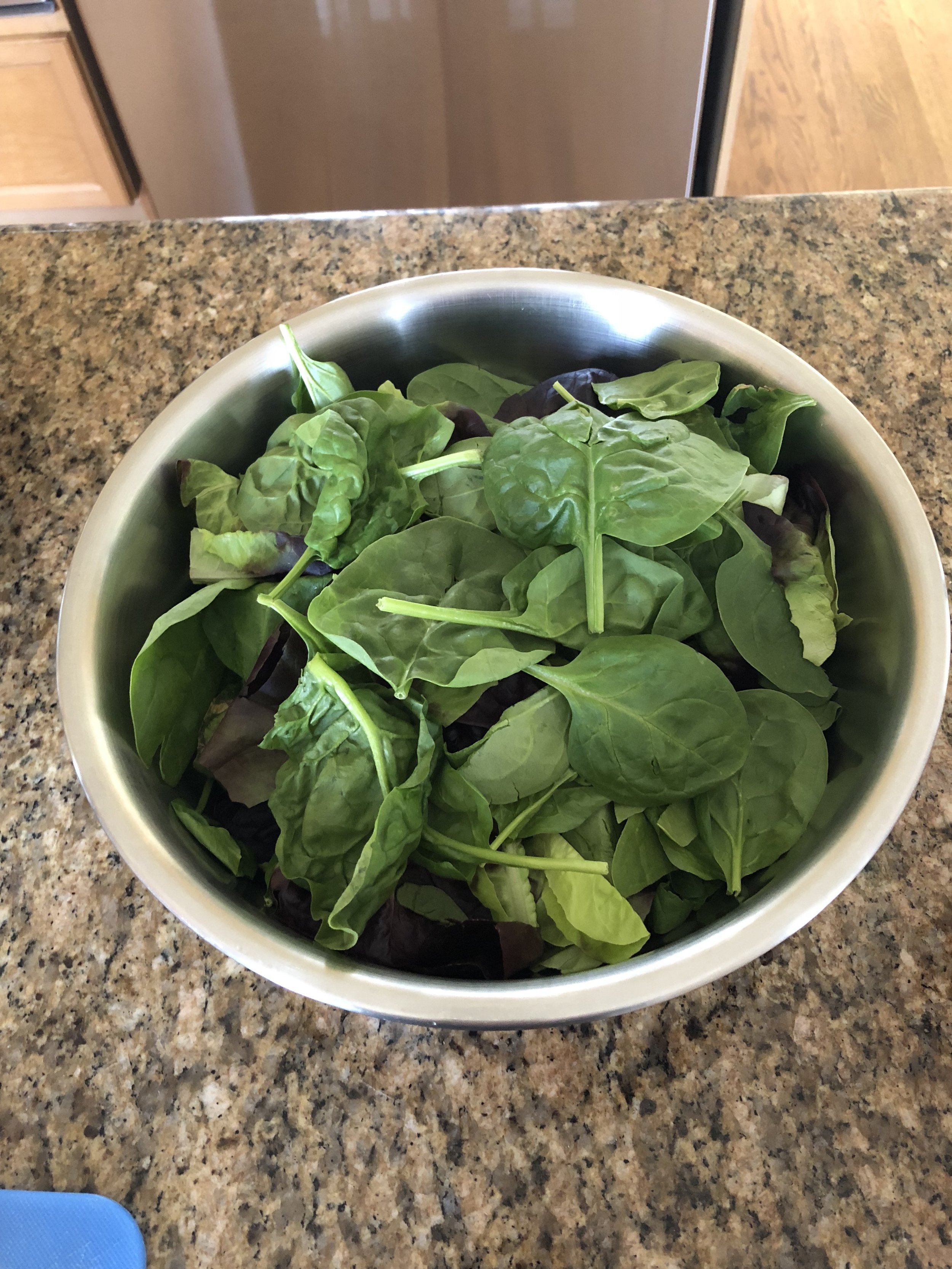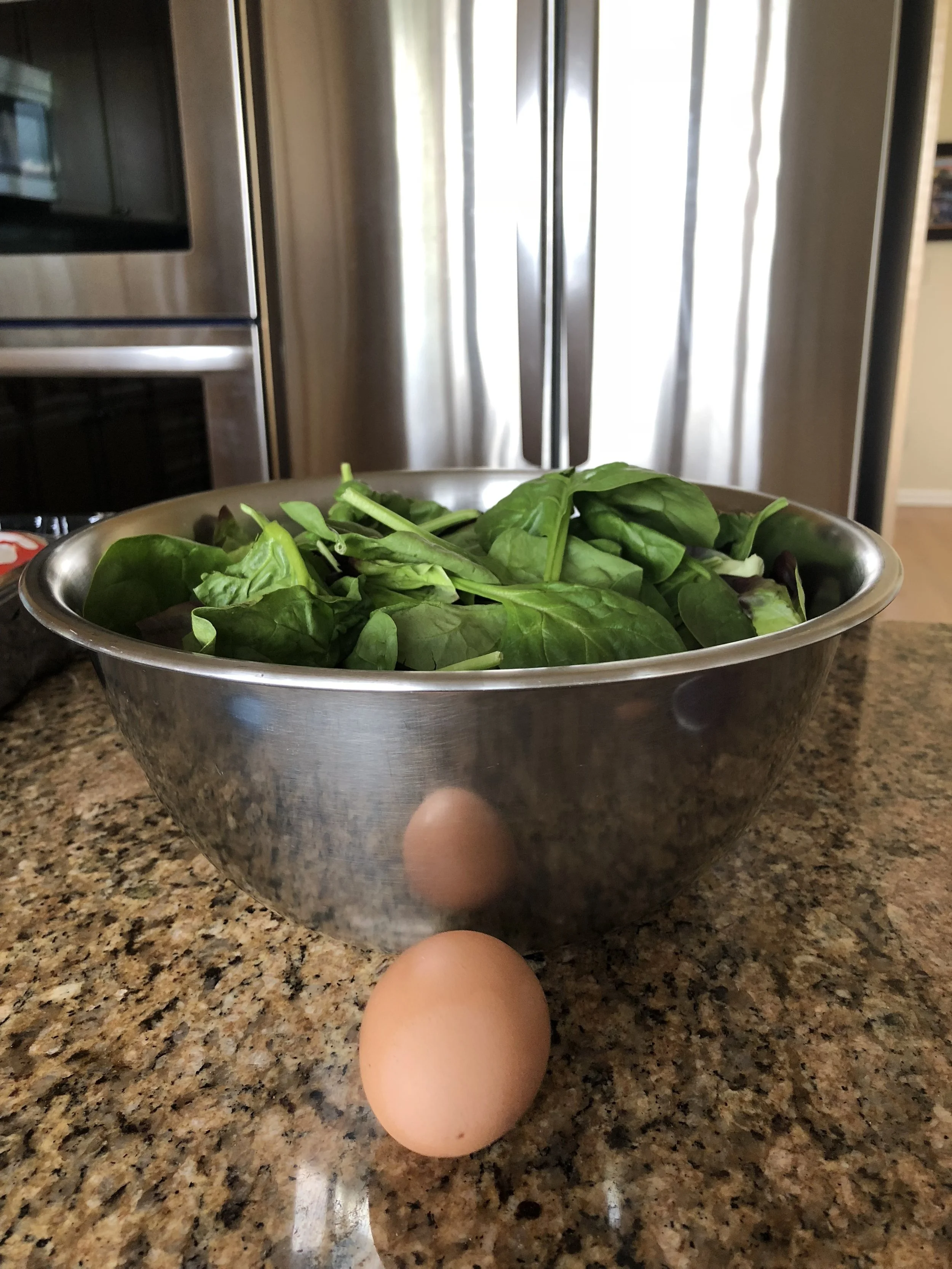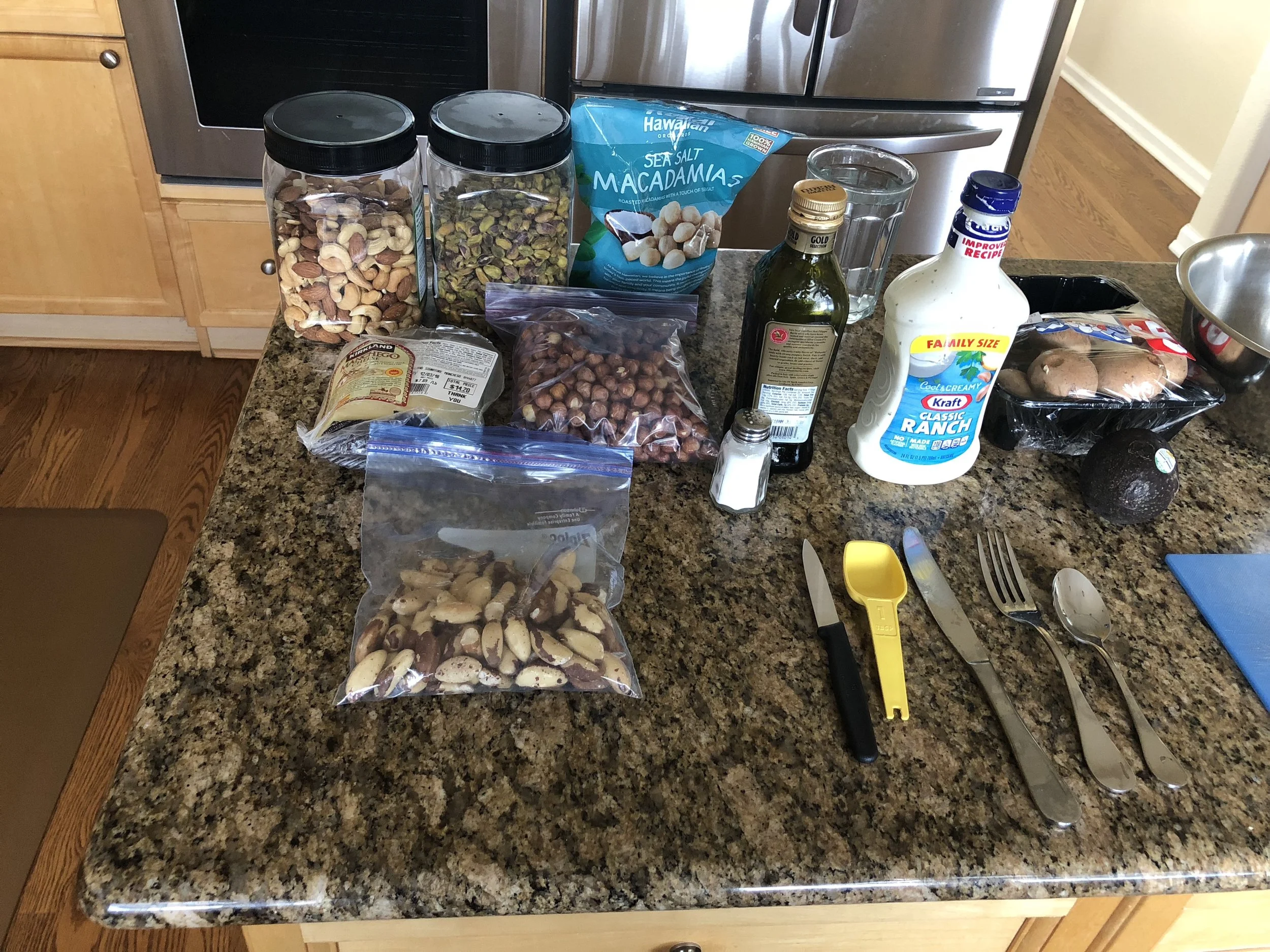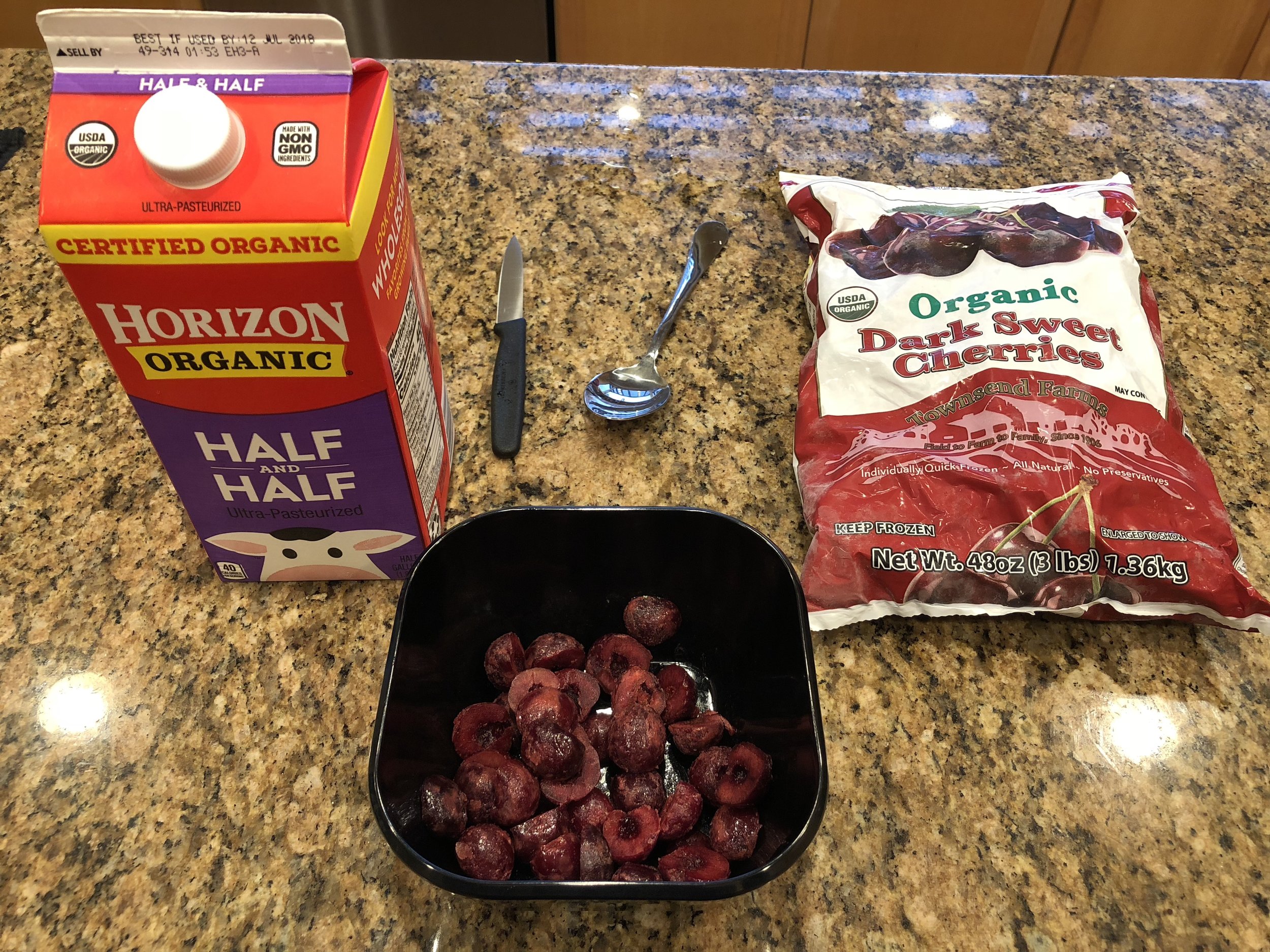My Giant Salad
Photo by Miles Spencer Kimball. I hereby give permission to use this image and the others in this post for anything whatsoever, as long as that use includes a link to this post.
Some of my readers have encouraged me to write about my own experience with trying to eat right and with weight loss. I tell my overall story on that front in "A Barycentric Autobiography," (which also has before and after photos). But I also want to detail my day-to-day, week-to-week practice of trying to eat right. Last week, in "Our Delusions about 'Healthy' Snacks—Nuts to That!" I wrote about snacks. Today is about my main dish on a typical day: a giant salad.
Based on my attempts to order something like it in restaurants when I am traveling, I know my giant salad can be described as a kind of Cobb salad. Gail and I were very lucky in the house we managed to nab when we moved to Colorado; among other things it has a wonderful kitchen with an island. You can see laid out both the ingredients for my giant salad and the snacks that I eat while making the salad:
Focusing in on just the ingredients:
Here is the breakdown of salad ingredients by retail source:
Costco:
One serving of Kirkland organic Hummus (from a box of single-serving containers)
a few pine nuts
7 pitted Kalamata olives
2 NestFresh cagefree eggs (box of 5 dozen)
3 tablespoons extra-virgin olive oil (bottle barely visible on the left)
Safeway:
1 avocado (Don't stint on this. Avocadoes are great.)
1 tomato
1/2 cucumber
4 mushrooms
1 stripe of full-fat ranch dressing (Don't overdo this; to me it ruins the taste to have too much
salt on the avocado and egg slices
prewashed lettuce or spinach; on this day I did some of each. "Tender Ruby Reds" last much longer than other types of prewashed lettuce before getting slimy. Spinach also lasts longer. So I eat the other types of lettuce first if I bought any other kinds.
I sometimes add a sliced radish or two for variety. Sometimes we bake broccoli or cauliflower with a little olive oil on it. Until that is gone, I always add some of that to my salad.
A key to this dish is to have lots of lettuce or spinach:
Note that I am using a large mixing bowl or serving bowl. When guests come, a salad that feeds me alone on a typical day can be a great side dish for a whole crowd. This amount is well over half the amount in a large plastic container of prewashed lettuce or spinach.
The photo at the top of the post shows what my giant salad looks like right before tossing. (Some of the ingredients are hidden under the ingredients on top. It doesn't look quite as good after tossing, but tastes better from the tossing.)
While making the salad, I snack on Manchego cheese and nuts:
Here are the retail sources:
Costco:
manchego cheese
cashews
almonds
macadamias
Whole Foods:
brazil nuts
hazelnuts (only available to buy seasonally, concentrated around December, but they will last a year if you buy a lot)
Two other staples are some fruit powder (see "Forget Calorie Counting; It's the Insulin Index, Stupid") and probiotic powder (see "Hints for Healthy Eating from the Nurse's Health Study") in almond milk, and a few squares of 88% chocolate (see "Intense Dark Chocolate: A Review").
Finally, for dessert, pitted frozen cherries with half and half. I cut the cherries in half to get the perfect bite, and don't stint on the half and half:
If my schedule allows, I eat all this at brunch time in an eating window of a couple of hours. Then I'm not hungry the rest of the day and don't eat the rest of the day. That schedule is in line with what I discuss in "Stop Counting Calories; It's the Clock that Counts" and "Obesity Is Always and Everywhere an Insulin Phenomenon." All of this is only for a typical day. Eating out at restaurants and occasional additions at home (that displace some of the snacks above) give me variety.
Don’t miss my other posts on diet and health:
I. The Basics
Jason Fung's Single Best Weight Loss Tip: Don't Eat All the Time
What Steven Gundry's Book 'The Plant Paradox' Adds to the Principles of a Low-Insulin-Index Diet
David Ludwig: It Takes Time to Adapt to a Lowcarb, Highfat Diet
II. Sugar as a Slow Poison
Best Health Guide: 10 Surprising Changes When You Quit Sugar
Heidi Turner, Michael Schwartz and Kristen Domonell on How Bad Sugar Is
Michael Lowe and Heidi Mitchell: Is Getting ‘Hangry’ Actually a Thing?
III. Anti-Cancer Eating
How Fasting Can Starve Cancer Cells, While Leaving Normal Cells Unharmed
Meat Is Amazingly Nutritious—But Is It Amazingly Nutritious for Cancer Cells, Too?
IV. Eating Tips
Using the Glycemic Index as a Supplement to the Insulin Index
Putting the Perspective from Jason Fung's "The Obesity Code" into Practice
Which Nonsugar Sweeteners are OK? An Insulin-Index Perspective
V. Calories In/Calories Out
VI. Other Health Issues
VII. Wonkish
Framingham State Food Study: Lowcarb Diets Make Us Burn More Calories
Anthony Komaroff: The Microbiome and Risk for Obesity and Diabetes
Don't Tar Fasting by those of Normal or High Weight with the Brush of Anorexia
Carola Binder: The Obesity Code and Economists as General Practitioners
After Gastric Bypass Surgery, Insulin Goes Down Before Weight Loss has Time to Happen
A Low-Glycemic-Index Vegan Diet as a Moderately-Low-Insulin-Index Diet
Analogies Between Economic Models and the Biology of Obesity
Layne Norton Discusses the Stephan Guyenet vs. Gary Taubes Debate (a Debate on Joe Rogan’s Podcast)
VIII. Debates about Particular Foods and about Exercise
Jason Fung: Dietary Fat is Innocent of the Charges Leveled Against It
Faye Flam: The Taboo on Dietary Fat is Grounded More in Puritanism than Science
Confirmation Bias in the Interpretation of New Evidence on Salt
Eggs May Be a Type of Food You Should Eat Sparingly, But Don't Blame Cholesterol Yet
Julia Belluz and Javier Zarracina: Why You'll Be Disappointed If You Are Exercising to Lose Weight, Explained with 60+ Studies (my retitling of the article this links to)
IX. Gary Taubes
X. Twitter Discussions
Putting the Perspective from Jason Fung's "The Obesity Code" into Practice
'Forget Calorie Counting. It's the Insulin Index, Stupid' in a Few Tweets
Debating 'Forget Calorie Counting; It's the Insulin Index, Stupid'
Analogies Between Economic Models and the Biology of Obesity
XI. On My Interest in Diet and Health
See the last section of "Five Books That Have Changed My Life" and the podcast "Miles Kimball Explains to Tracy Alloway and Joe Weisenthal Why Losing Weight Is Like Defeating Inflation." If you want to know how I got interested in diet and health and fighting obesity and a little more about my own experience with weight gain and weight loss, see “Diana Kimball: Listening Creates Possibilities” and my post "A Barycentric Autobiography. I defend the ability of economists like me to make a contribution to understanding diet and health in “On the Epistemology of Diet and Health: Miles Refuses to `Stay in His Lane’.”
